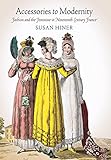Accessories to Modernity : Fashion and the Feminine in Nineteenth-Century France / Susan Hiner.
Material type: TextPublisher: Philadelphia : University of Pennsylvania Press, [2011]Copyright date: ©2010Description: 1 online resource (296 p.) : 30 illusContent type:
TextPublisher: Philadelphia : University of Pennsylvania Press, [2011]Copyright date: ©2010Description: 1 online resource (296 p.) : 30 illusContent type: - 9780812242591
- 9780812205336
- Clothing and dress -- France -- History -- 19th century
- Clothing and dress -- France -- History -- 19th century
- Fashion -- France -- History -- 19th century
- Fashion -- France -- History -- 19th century
- Women -- France -- History -- 19th century
- Women -- France -- History -- 19th century
- Gender Studies
- LITERARY CRITICISM / European / French
- Cultural Studies
- Gender Studies
- Literature
- Women's Studies
- 391.00944/09034 22
- GT871 .H56 2010
- online - DeGruyter
- Issued also in print.
| Item type | Current library | Call number | URL | Status | Notes | Barcode | |
|---|---|---|---|---|---|---|---|
 eBook
eBook
|
Biblioteca "Angelicum" Pont. Univ. S.Tommaso d'Aquino Nuvola online | online - DeGruyter (Browse shelf(Opens below)) | Online access | Not for loan (Accesso limitato) | Accesso per gli utenti autorizzati / Access for authorized users | (dgr)9780812205336 |
Frontmatter -- Contents -- List of Illustrations -- Prologue -- 1. La Femme comme il (en) faut and the Pursuit of Distinction -- 2. Unpacking the Corbeille de mariage -- 3. "Cashmere Fever": Virtue and the Domestication of the Exotic -- 4. Mademoiselle Ombrelle: Shielding the Fair Sex -- 5. Fan Fetish: Gender, Nostalgia, and Commodification -- 6. Between Good Intentions and Ulterior Motives: The Culture of Handbags -- Epilogue. The Feminine Accessory -- Notes -- Bibliography -- Index -- Acknowledgments
restricted access online access with authorization star
http://purl.org/coar/access_right/c_16ec
Accessories to Modernity explores the ways in which feminine fashion accessories, such as cashmere shawls, parasols, fans, and handbags, became essential instruments in the bourgeois idealization of womanhood in nineteenth-century France. Considering how these fashionable objects were portrayed in fashion journals and illustrations, as well as fiction, the book explores the histories and cultural weight of the objects themselves and offers fresh readings of works by Balzac, Flaubert, and Zola, some of the most widely read novels of the period.As social boundaries were becoming more and more fluid in the nineteenth century, one effort to impose order over the looming confusion came, in the case of women, through fashion, and the fashion accessory thus became an ever more crucial tool through which social distinction could be created, projected, and maintained. Looking through the lens of fashion, Susan Hiner explores the interplay of imperialist expansion and domestic rituals, the assertion of privilege in the face of increasing social mobility, gendering practices and their relation to social hierarchies, and the rise of commodity culture and woman's paradoxical status as both consumer and object within it.Through her close focus on these luxury objects, Hiner reframes the feminine fashion accessory as a key symbol of modernity that bridges the erotic and proper, the domestic and exotic, and mass production and the work of art while making a larger claim about the "accessory" status-in terms of both complicity and subordination-of bourgeois women in nineteenth-century France. Women were not simply passive bystanders but rather were themselves accessories to the work of modernity from which they were ostensibly excluded.
Issued also in print.
Mode of access: Internet via World Wide Web.
In English.
Description based on online resource; title from PDF title page (publisher's Web site, viewed 24. Apr 2022)


